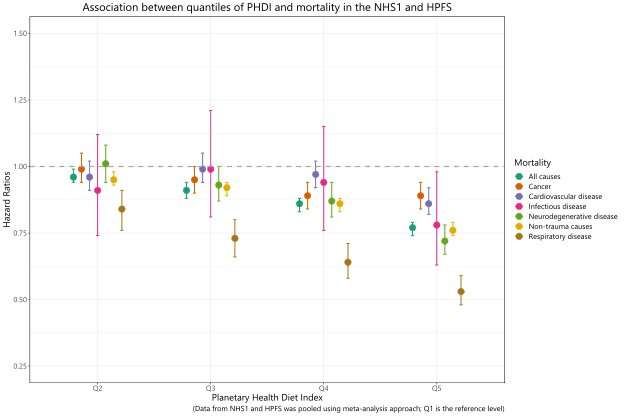This article has been reviewed according to Science X's editorial process and policies. Editors have highlighted the following attributes while ensuring the content's credibility:
fact-checked
trusted source
proofread
Eating more planet-friendly foods may help you live longer

Eating more planet-friendly foods could help you live a longer, healthier life, according to new research. Researchers found that people who followed a more environmentally sustainable diet were 25% less likely to die during a follow-up period of over 30 years compared to those with a less sustainable diet.
The study builds upon prior research that identified foods that are a win-win for both health and the environment—such as whole grains, fruit, non-starchy vegetables, nuts, and unsaturated oils—as well as foods that could be harmful to the environment and human health, like eggs and red and processed meats.
The new findings suggest eating more planet-friendly foods can help reduce a person's risk of death from causes such as cancer, heart disease, respiratory diseases, and neurodegenerative diseases.
"We proposed a new diet score that incorporates the best current scientific evidence of food effects on both health and the environment," said Linh Bui, MD, a Ph.D. candidate in the Department of Nutrition at Harvard T.H. Chan School of Public Health. "The results confirmed our hypothesis that a higher Planetary Health Diet score was associated with a lower risk of mortality."
Bui will present the findings at NUTRITION 2023, the annual meeting of the American Society for Nutrition held July 22–25 in Boston.
According to existing evidence, plant-based foods are associated with both a lower risk of chronic diseases such as heart disease, colorectal cancer, diabetes, and stroke, and reduced impacts to the environment in terms of factors like water use, land use, nutrient pollution, and greenhouse gas emissions.
With the new study, the researchers aimed to create a simple tool that policymakers and public health practitioners could use to develop strategies to improve public health and address the climate crisis.
"As a millennial, I have always been concerned about mitigating human impacts on the environment," said Bui. "A sustainable dietary pattern should not only be healthy but also consistent within planetary boundaries for greenhouse gas emissions and other environmental parameters."
To create their Planetary Health Diet Index (PHDI), researchers reviewed existing research on the relationships between various food groups and health outcomes based on the EAT-Lancet reference diet that accounts for the environmental impacts of food production practices. They then applied the index to analyze outcomes among over 100,000 participants in two large cohort studies conducted in the United States. The data set included over 47,000 deaths during a follow-up period spanning over three decades from 1986–2018.
Overall, they found that people in the highest quintile (the top one-fifth of participants) for PHDI had a 25% lower risk of death from any cause compared to those in the lowest quintile. Higher PHDI scores were associated with a 15% lower risk of death from cancer or cardiovascular diseases, a 20% lower risk of death from neurodegenerative disease, and a 50% lower risk of death from respiratory diseases.
Bui cautioned that the PHDI does not necessarily reflect all food items and their relationships with all major diseases in all countries. People with specific health conditions, religious restrictions, or different food accessibility due to socioeconomic status or food availability may face challenges with adhering to a more sustainable diet pattern. Further research could help to elucidate and address such barriers.
"We hope that researchers can adapt this index to specific food cultures and validate how it is associated with chronic diseases and environmental impacts such as carbon footprint, water footprint, and land use in other populations," said Bui.
More information: Bui will present this research at 11:45 a.m. EDT on Sunday, July 23, during the Dietary Patterns Poster Session in the Hynes Convention Center Hall C (abstract; presentation details).





















